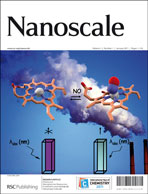Electrochemistry in nanoscopic volumes
Abstract
Exploration of electrochemical properties in ultrasmall volumes is still an emerging area. It is not only of great importance for the fundamental research, but also endowed with practical significance in the area of bioanalysis and medicine. Microelectrodes with superior electrochemical characteristics and versatile configurations are suitable tools for the investigation in confined geometries, and remarkable progress involving both preparation methods and theoretical interpretation has been made during the last few decades. Despite this success, electrochemical studies in nanoscopic volumes are still highly challenging due to the less predictable situations in very limited spatial and temporal domains, as well as difficulty in micromanipulation at the nanoscale. In this mini-review, we will summarize the main strategies for this topic, briefly look through the recent advances, and specifically introduce the design and application of a new kind of on-chip ultrasmall electrochemical cells based on micro- and nanogap electrodes, which are prepared by photolithographic method with volume ranging from femtolitre to attolitre. Finally, the limits of current systems and the future perspectives of this field are discussed.


 Please wait while we load your content...
Please wait while we load your content...